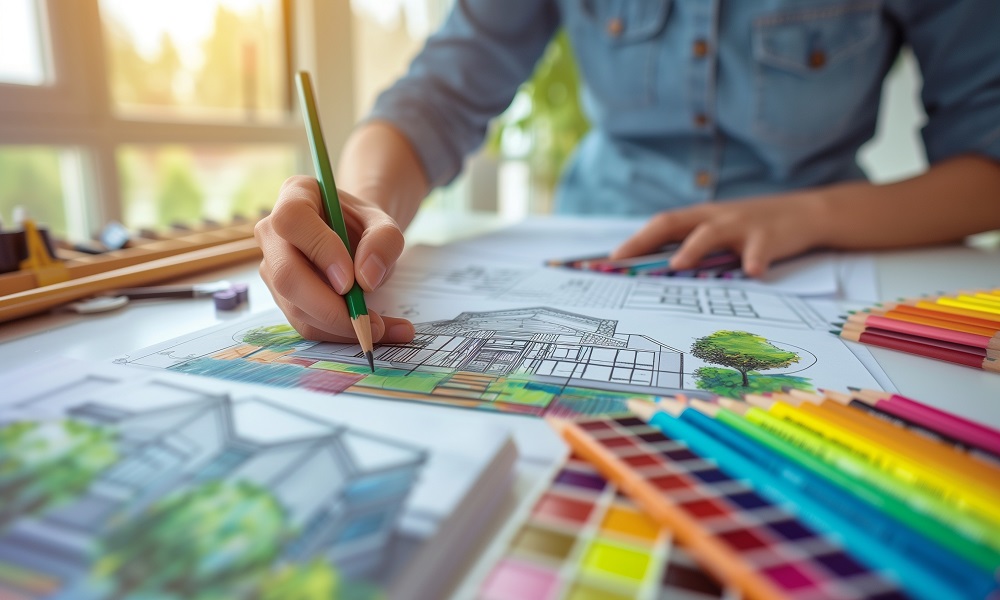A Bachelor of Interior Design is an exciting and creative pathway for individuals passionate about transforming spaces into functional and aesthetically pleasing environments. This program equips students with the skills and knowledge needed to excel in the interior design field. Here’s what you need to know about the Bachelor of Interior Design program, including course details, fees, and career opportunities.
Understanding Interior Design
Interior design involves planning and creating functional spaces that meet the needs of individuals and organizations. It encompasses a wide range of elements, including color schemes, furniture selection, spatial layout, lighting, and materials. Interior designers work on various projects, from residential homes to commercial spaces, ensuring that each design is not only visually appealing but also practical and sustainable.
Bachelor’s in interior design: Key Features
A bachelor’s degree in interior design typically spans three to four years, depending on the institution and curriculum structure. The program is designed to provide a comprehensive understanding of design principles, technical skills, and project management. Students learn to combine creativity with functionality, preparing them for a career in a competitive industry.
Course Duration
The duration of a Bachelor of Interior Design program usually ranges from three to four years, depending on the structure of the program and the institution. Most programs consist of a combination of lectures, studio work, and practical projects, allowing students to gain hands-on experience in real-world design scenarios.
Eligibility Criteria
To enroll in a Bachelor of Interior Design program, candidates typically need to have completed their higher secondary education (12th grade). While many institutes accept students from any stream, having a background in arts or design can be advantageous. Some institutions may also require candidates to pass an entrance examination or present a portfolio showcasing their creative skills.
Interior Design Course Subjects
The curriculum for a Bachelor of Interior Design program usually covers a wide array of subjects, providing students with a well-rounded education in the field. Common subjects include:
- Design Fundamentals: An introduction to the principles and elements of design, including color theory, spatial relationships, and material selection.
- Interior Architecture: This subject focuses on the architectural aspects of interior design, including layout planning, building codes, and structural considerations.
- Furniture Design: Students learn about designing and selecting furniture that complements the overall design while meeting functional needs.
- Lighting Design: An exploration of the role of lighting in interior spaces, including types of lighting, techniques, and how to create mood and ambiance.
- Sustainable Design: This subject emphasizes eco-friendly design practices, teaching students how to incorporate sustainable materials and practices into their projects.
- Computer-Aided Design (CAD): Students learn to use CAD software to create detailed design plans, enabling them to visualize their ideas digitally.
- History of Interior Design: A study of the evolution of interior design styles and trends, helping students understand the cultural influences on design.
- Project Management: This subject covers the organizational skills necessary to manage design projects effectively, including budgeting, scheduling, and client communication.
Institutes for Interior Designing
Choosing the right institute is crucial for aspiring interior designers. Various institutes offer specialized Bachelor of Interior Design programs, especially in metropolitan areas like Mumbai and Navi Mumbai. When selecting a school, consider factors such as faculty expertise, industry connections, and the availability of practical training opportunities.
Interior Design Course in Mumbai
Mumbai is home to numerous esteemed institutions offering Bachelor of Interior Design programs. These courses often feature a blend of theoretical knowledge and practical projects, allowing students to apply what they learn in real-world scenarios. Additionally, many colleges have strong ties to the industry, providing students with valuable internship opportunities.
Interior Design Course in Navi Mumbai
Navi Mumbai has also emerged as a hub for design education, with various institutes offering quality programs in interior design. Students in Navi Mumbai can benefit from a range of courses that cover both the artistic and technical aspects of the field. Researching different programs and visiting campuses can help prospective students find the best fit for their educational and career goals.
Interior Design Courses Fees
The fees for a Bachelor of Interior Design program can vary significantly based on the institution and location. Generally, interior design courses fees can range from moderate to high, depending on the college’s reputation and facilities. It’s essential to consider the overall value of the program, including faculty expertise, resources, and placement opportunities.
Career Opportunities After a Bachelor of Interior Design
Graduating with a Bachelor of Interior Design opens up various career paths in a dynamic field. Interior designers can work in diverse settings, from residential projects to large-scale commercial designs. Here are some potential career options:
- Interior Designer: Responsible for creating functional and aesthetically pleasing spaces for clients, interior designers work on various projects, including homes, offices, and retail spaces.
- Furniture Designer: Specializing in the design and creation of furniture pieces, these professionals often collaborate with manufacturers to bring their designs to life.
- Lighting Consultant: Focusing on the selection and placement of lighting fixtures, lighting consultants enhance the ambiance and functionality of interior spaces.
- Space Planner: These professionals specialize in optimizing spatial layouts for various environments, ensuring that spaces are utilized efficiently.
- Exhibition Designer: Working on trade shows, galleries, and events, exhibition designers create engaging spaces that attract and inform visitors.
- Design Educator: With experience and advanced degrees, some graduates choose to teach interior design at colleges and universities, sharing their knowledge with the next generation of designers.
Conclusion
A Bachelor of Interior Design program is an excellent choice for those interested in creating beautiful and functional spaces. With a comprehensive curriculum, hands-on experience, and numerous career opportunities, this degree can pave the way for a successful career in the interior design industry.
By understanding the course details, fees, and potential career paths, prospective students can make informed decisions about their education and future in this exciting field. Whether in Mumbai or Navi Mumbai, aspiring interior designers have access to quality programs that can help them develop their skills and realize their creative visions. If you are passionate about design and looking to make an impact through your work, pursuing a Bachelor in Interior Design could be the perfect fit for you.





